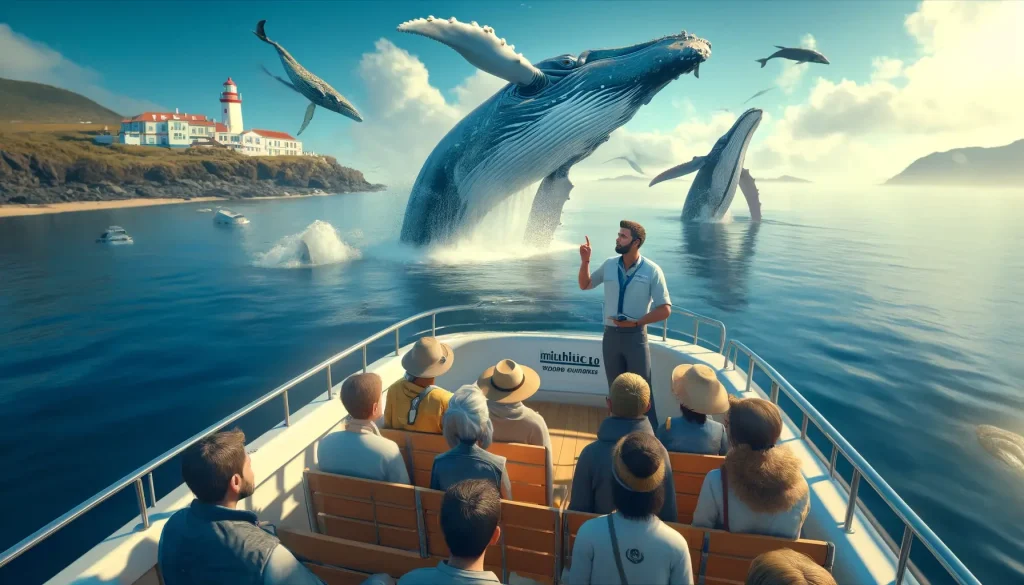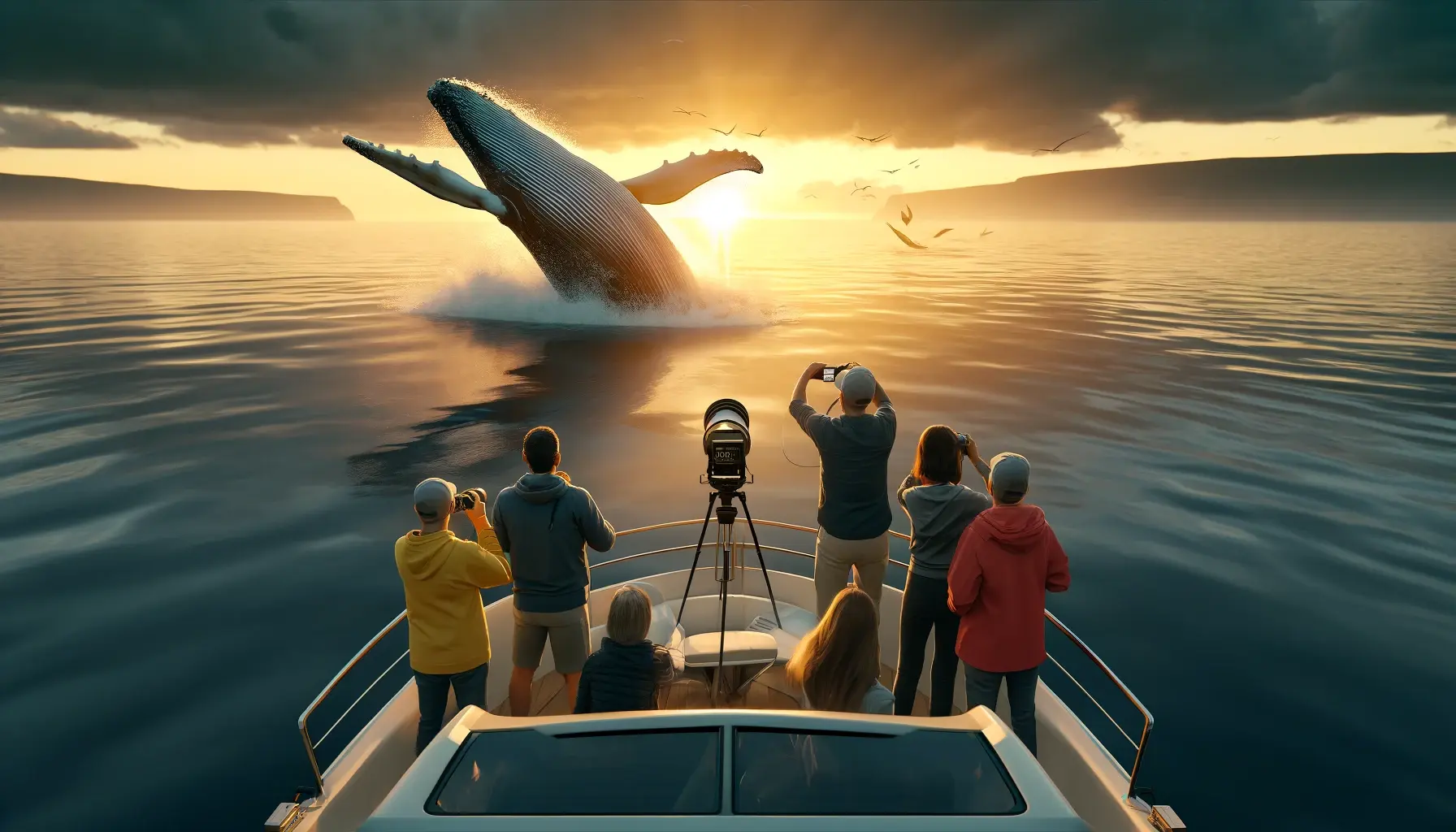Get ready to zip across the dazzling sapphire waters of the North Atlantic, feeling the cool sea breeze play with your hair while you engage in a magical encounter with some of the ocean’s most awe-inspiring inhabitants! This isn’t just any water escapade; it’s an exhilarating whale watching adventure in the Azores! Watch as these majestic mammals gracefully leap and twirl through their watery home. You’re not merely a spectator here—you’re an active participant in a timeless tradition that continues to thrill and amaze!
The allure of Azores whale watching lies not only in the thrilling encounters with whales but also in its deep cultural roots. For locals, these creatures symbolize both historical livelihood and spiritual significance, offering travelers like us a rare glimpse into authentic Azorean life. As someone who thrives on genuine cultural experiences and shies away from tourist-heavy spots, I found my encounter here to be profoundly enriching.
In this article, I’ll take you through what makes whale watching in the Azores a unique cultural expedition rather than just another check on your travel bucket list. From understanding local whaling history to tips on making the most out of your visit—prepare to dive deep into an experience that resonates with adventure and authenticity!
Understanding Azores Whale Watching
If you’re a young, adventurous traveler looking to dive deep into authentic experiences, whale watching in the Azores is an unmissable activity that blends excitement with natural beauty. Nestled in the heart of the Atlantic Ocean, this archipelago offers one of the world’s premier locations for spotting these majestic creatures.
- Why the Azores? The islands sit at a unique crossroads of migratory routes for various whale species, making it possible to sight not just one but multiple types during a single trip. From April to October, species like Sperm Whales, Blue Whales, and even Orcas grace these waters.
Here’s what makes whale watching here truly special:
- Sustainable Practices: The local operators are committed to ecological conservation. They use practices that minimize environmental impact and educate visitors on the importance of preservation.
- Expert Guides: Many tours are led by marine biologists who provide insightful commentary and answer all your burning questions about marine life.
For those planning their adventure:
- Best Time to Go: Peak season is from April through October when migration patterns bring whales closer to the islands.
- Choosing a Tour: Look for small group tours which offer a more personalized experience and better chances of sightings without crowding.
| Month | Likely Whales To See |
|---|---|
| April-June | Blue Whales, Fin Whales |
| July-August | Sperm Whales, Pilot Whales |
| September | Humpback Whales |
Lastly don’t forget to pack essentials like binoculars camera warm clothing and seasickness pills! Joining a whale watching tour in the Azores isn’t just about seeing whales; it’s about immersing yourself in nature while respecting its rhythms and learning directly from experts who share your passion for adventure. Happy spotting!
Planning Your Whale Watching Trip
Embarking on a whale watching adventure in the Azores is truly exhilarating! To make the most of it, timing is everything. The peak season for spotting these magnificent creatures stretches from April to October. During this window, you’re more likely to witness a variety of species including the majestic blue whale and the playful dolphins.
Before setting sail, choosing a reputable tour operator is crucial. Look for ones that prioritize sustainability and have knowledgeable guides. These operators not only offer insight into whale behavior but also adopt practices that minimize environmental impact. Here are some top-rated companies known for their responsible practices and exceptional tours:
- Futurismo, Moby Dick Tours and Picos de Aventura in Ponta Delgada
- Terra Azul in Vila Franca
- Espaço Talassa in Pico
Packing smart can significantly enhance your experience. Due to the Azores’ variable weather, bring layers that you can add or remove as needed. Waterproof gear is essential—not just for possible rain but also for sea spray during your boat trip. Don’t forget essentials like binoculars for clear viewing and a camera with a good zoom to capture distant breaches.
Here’s a quick checklist to help ensure you’ve got everything:
- Waterproof jacket and pants
- Binoculars
- Camera with zoom lens
- Sunscreen (even on cloudy days)
- Seasickness medication if prone to motion sickness
Finally, immerse yourself fully by learning about local conservation efforts once there. Many tour operators provide educational materials or talks about protecting marine life which can be both inspiring and enlightening.
By following these steps, your whale watching trip in the Azores will not only be memorable but also respectful towards the marine environments you’re exploring!

Experiencing Whale Watching in the Azores
Imagine setting out on a boat as the sun peeks above the horizon, painting the sky with hues of orange and pink. You’re in the Azores, an archipelago where whale watching isn’t just an activity; it’s an encounter with nature at its most majestic. The cool Atlantic breeze mingles with excited chatter as everyone aboard readies their cameras.
The Azores is one of the world’s prime spots for whale watching, thanks to its deep waters close to shore which serve as pathways for migrating whales. Here you might spot not only sperm whales but also blue whales, fin whales, and even orcas during certain times of the year. It’s a thrilling sight when a whale breaches – launching itself from the water and splashing back down!
Whale watching tours here are conducted with respect for these gentle giants, adhering to strict regulations that ensure minimal disturbance to them. This responsible approach enhances your experience, knowing you’re observing these creatures without harming their natural behaviors.
- Best Time to Visit: March through October
- Commonly Spotted Species: Sperm whales, blue whales
- Possible Sightings: Orcas, dolphins
To make your adventure seamless:
- Choose a certified tour operator.
- Wear layers; weather can change quickly.
- Bring binoculars for better views.
By engaging with local guides who share anecdotes about past expeditions and insights into marine life behaviors, you gain more than just a sighting; you learn about conservation efforts and the importance of these magnificent animals in our ecosystem.
For those looking to fully immerse themselves in local culture while joining a whale-watching expedition:
- Engage with locals at nearby markets before your trip.
- Learn some basic Portuguese phrases to interact onboard.
- Ask guides about sustainable practices in tourism they follow.
When planning this unique experience remember that each trip out into the ocean offers unpredictable delights – no two journeys are ever alike!
Summing Up
Wrapping up our Azores whale watching adventure, it’s clear that this experience is a must for anyone craving an authentic connection with nature. I’ve gathered some key takeaways to help you plan your trip, ensuring it’s as magical and genuine as possible.
Firstly, timing is crucial. The best months for whale watching in the Azores are from April to October when the variety of species spotted is at its peak. Here’s a quick look at what you might see:
| Month | Likely Sightings |
|---|---|
| April-June | Blue whales, fin whales |
| July-August | Sperm whales, pilot whales |
| September | Sei whales, beaked whales |
To truly immerse yourself in the local culture and avoid the typical tourist paths:
- Engage with local guides who can provide insights not only into whale watching but also into the Azorean way of life.
- Opt for smaller group tours or private charters to enhance your experience and reduce environmental impact.
Remember to pack responsibly! Essentials include:
- Binoculars for clearer viewing
- Eco-friendly sunblock
- A waterproof jacket (the weather can be unpredictable!)
Before you go make sure to check out some of our interactive tools like budget planners and packing guides available on my blog. These resources are designed to help streamline your planning process.
I hope this guide inspires you to visit the Azores and witness these majestic creatures in their natural habitat. Don’t forget if you’re looking for more tips on how to blend in like a local or need advice on navigating other aspects of your trip feel free to reach out through my contact page!
Ready for an adventure that ticks all the right boxes? Start planning your journey today and prepare to be amazed by the beauty of Azores whale watching!
Common Questions About Whale Watching, Answered
Are there any recommendations for whale watching excursions in the Azores?
Some recommended companies for whale watching in the Azores include Futurismo and Picos de Aventura in Ponta Delgada, and Terra Azul in Vila Franca. It is advised to choose a company that respects animal welfare and follows rules on approaching the animals to ensure a positive experience.
What factors should I consider when selecting a whale watching tour?
When choosing a whale watching tour, consider the company’s approach to animal welfare and adherence to rules on approaching the animals. Additionally, it is recommended to book on days with low waves and wind for a better experience. For those prone to seasickness, it is advisable to bring medication. The choice between smaller speed boats and larger catamarans depends on personal preference and the island you are staying on
Which whale watching company is recommended for a more ethical experience?
Terra Azul is a highly recommended company for whale watching in the Azores. However, it is noted that Terra Azul allows swimming with dolphins, which may raise ethical concerns for some visitors
Are there any affordable and family-friendly whale watching tours available?
Moby Dick Tours is highlighted as a family business that offers affordable tours with knowledgeable owners. Visitors have reported positive experiences with Moby Dick Tours, emphasizing the abundance of marine life seen during their excursions
What is the feedback on whale watching tours with Terra Azul in Villa Franca?
Visitors who have taken tours with Terra Azul in Villa Franca have praised the company for respecting distances from the animals and providing knowledgeable tour guides. Overall, experiences with Terra Azul have been positive, with visitors expressing satisfaction and a willingness to book with them again
Any recommendations for whale watching excursions in Pico?
Espaço Talassa is a popular whale watching company in Pico that is recommended by visitors. It is known for its professionalism and the quality of dolphin and whale watching experiences
